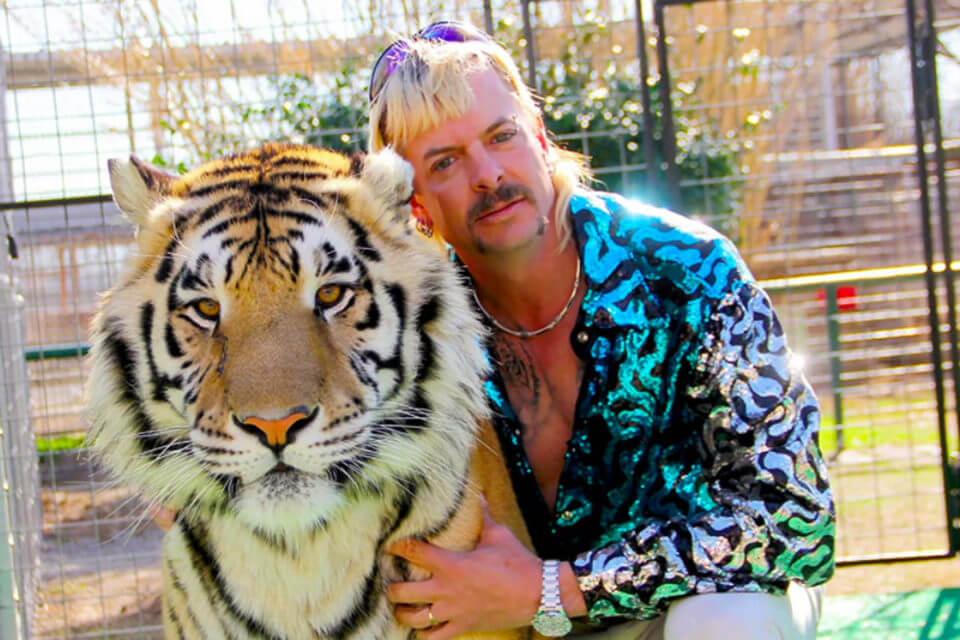
“The United States needs a reality check. Yes, race has been a major issue in the country’s history. But class matters, and we must never forget that.”
Netflix’s Tiger King: Murder, Mayhem, and Madness has plenty of the three crucial elements of success in the modern entertainment industry: sex, drugs and rock-and-roll (or, in this case, country-rock). No wonder audiences are binge-watching. But, there is more. There are Shakespearean themes of loyalty, revenge, decadence, and doubt. And, the fact that this is a docuseries—and, not just fiction—makes it even more appealing.
The show offers a glimpse into the world of big cats breeders in the United States. Joe Exotic runs a profitable private zoo, with highly questionable practices, including feeding the animals with dumped meat from Walmart, shooting tigers once they reach adulthood, and keeping large felines in small cages. On the personal side, Joe is not exactly nice, either; he sexually predates younger heterosexual males by offering them drugs. Also, he is constantly paranoid and continuously threatens other people.
One self-righteous woman, Carole Baskin, claims to be an animal rights activist. She then begins a crusade against Joe. But, as the show goes on, we find out that she does not care much about animals, and, in fact, she has dirty secrets of her own. The show then develops into a major feud between Joe and Carole, and, in the end, we don’t really know who is worse.
Animal abuse is inexcusable. But, then again, can the crusade against animal abuse serve as a cover for bigotry? In face of the Michael Vick affair, social justice activists now believe so. Vick was accused of running a dogfighting scheme and was duly sentenced to prison. However, anti-racism activists felt that the justice system’s response was disproportional, with the media circus surrounding it being another example of the degradation of African Americans. They had a point.
Joe Exotic is not an African American. He is a “white trash.” He makes money, but his house is a mess. He has charisma, but his manners are null. He is unabashedly a country-music-singing, gun-toting, mullet-hairstyle redneck. His entourage is not exactly glamorous, either. There is a toothless young husband, a one-armed macho-looking female assistant, and a legless employee who struggles finishing a grammatically correct sentence.
At some point, Tiger King feels like Deliverance all over again. Nothing good can come out of these hillbillies. You wonder if—with all that banjo-music in the background—some sub-human backcountry person will come out to sodomize a nice urbanite gentleman. Squeal like a pig! The feud between Joe and Carole feels like a re-telling of the Hatfields and the McCoys—only this time, cute little tiger cubs are involved. Jerry Springer could not have dreamed of better misfits for his show.
Now, keep in mind that Tiger King is not fiction. So, you might think that producers are off the hook because they are not degrading country yokels. They are only portraying their culture as it is. If anything, these individuals are degrading themselves by inhumanely keeping tigers in cages, singing diss songs to the tune of country music, and making facial grimaces because of all the methamphetamine they have been taking.
Think again. Cops was also real footage. All those black criminals running from white policemen were not actors. If anything, so the argument could be made, Cops realistically depicted black cultural pathology. But, let’s face it: The show contributed to racism. When you morbidly show criminals of a particular ethnic group—but care little about that group’s physicians, teachers, and honest people—we have a problem.
African Americans have the NCAAP, Hispanics have UnidosUS, and Jews have the American Jewish Committee. So, you can make a show like Cops, but expect pushback from antiracists. But, who do rural whites have for advocates? Nobody. According to social justice activists, they already have the system in their favor—because their pale skin makes them privileged. Yeah, right. So, the black middle-class urbanite loathing Joe Exotic for his mullet hairstyle is off the hook because, remember, black people can’t be racist. However, if Don Imus makes ugly comments about “nappy-headed” women, all hell breaks loose. You can use “redneck” as an insult but never dare utter the N-word. You can be aghast at the sheer barbarity of the Hatfields and the McCoys, but you must understand the root social causes of the Crips and Bloods feud. You can laugh at Cletus Spuckler all you want in The Simpsons, but hey, Apu was very offensive to Indians, so you should be glad that he is no longer in the show.
This is the big lie of much anti-racist activism. Activists claim to abhor essentialism. However, when it comes to white people, their essentialism is rampant. You may be a descendant of indentured serfs; society may accuse you of routinely practicing incest; elites in the past would have preferred to have you sterilized for eugenic reasons; you may be mocked because of your musical and hairstyle preferences; you may live in a trailer. But, you are embedded in an essence: You are white. And, inasmuch as you share the same skin color as slaveholders (only 6% of Southern whites at the time of the Civil War), segregationist politicians, and racist cops, you can never be a victim. Yes, it may look like you are in the receiving end of oppression; however, because of your racial essence, you are not. In fact, if you are white and you are poor, you deserve what you get, because—if being privileged you end up in a trailer—then something must be wrong with you. No wonder liberals who are lectured about white privilege end up hating poor whites, as it has been demonstrated in recent studies.
The United States needs a reality check. Yes, race has been a major issue in the country’s history. But class matters, and we must never forget that. Nancy Isenberg aptly describes it in White Trash: The 400 Year Untold History of Class in America: “Americans lack any deeper appreciation of class. Beyond white anger and ignorance is a far more complicated history of class identity that dates back to America’s colonial period and British notions of poverty. In many ways, our class system has hinged on the evolving political rationales used to dismiss or demonize (or occasionally reclaim) those white rural outcasts seemingly incapable of becoming part of the mainstream society.”
One can follow Isenberg’s approach and claim that both poor whites and blacks have been victims of oppression. Or, one can follow Thomas Sowell’s approach in Black Rednecks and White Liberals and claim that blacks ultimately learned from poor whites all their dysfunctionality and—instead of claiming victim status—they need to clean up their act. Whatever approach one takes (either excusing them as victims, or urging them to take responsibility), the important thing is that one ought to be consistent: Poor people are poor people, regardless of their skin color.
Truth be told, Tiger King is not Deliverance. The producers do run the extra mile to portray the protagonist’s culture in a more sophisticated way. In the end, some may even feel sympathy for Joe Exotic (Cardi B, true to her relentlessly sincere spirit, has no qualms about it), even while agreeing that tigers deserve better treatment. But, it seems to me this show should be a wake-up call—not just to liberate animals from cages, but to think about disenfranchised whites. They have no NAACP to turn to, so unless we tone down the identity-politics game, they will soon rally around their own aggressive identity politics. And then things could get ugly. In fact, they have already done so—by voting for a guy who resembles Joe Exotic in more than one way: Donald J. Trump.
Dr. Gabriel Andrade is a university professor. He has previously contributed to Areo Magazine and DePauw University’s The Prindle Post. His twitter is @gandrade80










